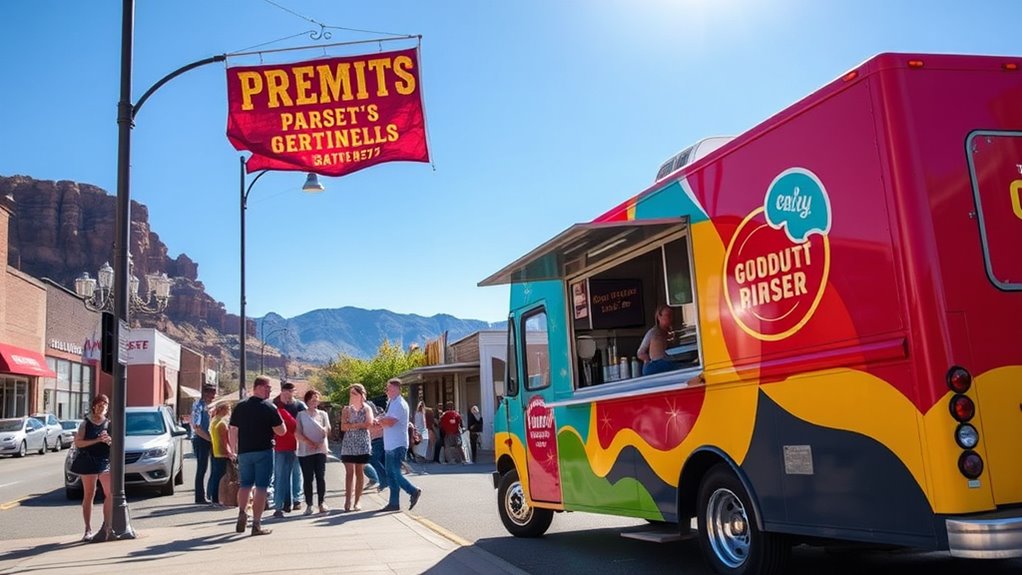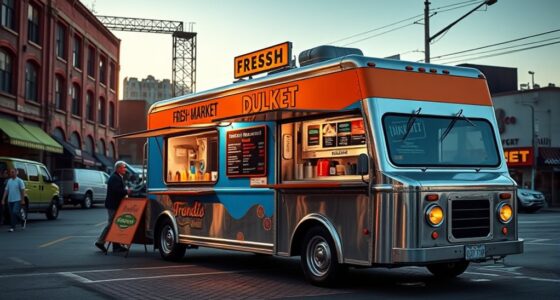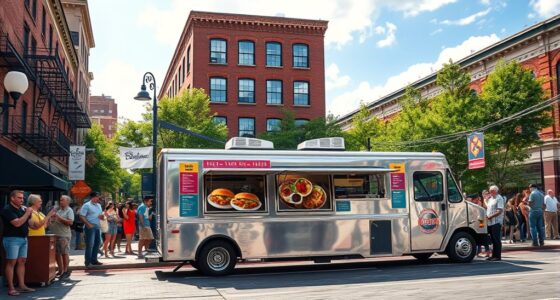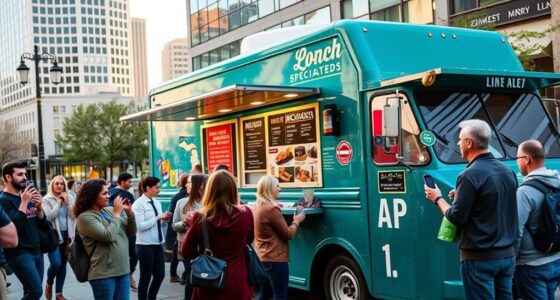To start a food truck in Twin Falls, Idaho, you’ll need to secure permits like health, fire safety, and business licenses, while budgeting $40,000 to $150,000 for the truck and around $1,864 to $28,276 for permits. Choose locations carefully based on zoning laws, develop a simple menu that meets safety standards, and focus on marketing via social media and local events. Further steps will help guarantee you stay compliant and succeed long-term.
Key Takeaways
- Obtain necessary permits, licenses, and pass inspections for health, fire safety, and zoning compliance before launching your food truck.
- Budget $40,000–$150,000 for truck purchase/lease, permits ($1,864–$28,276), and monthly operating costs ($500–$1,000).
- Ensure location approval in commercial or mixed-use zones, and coordinate with Twin Falls officials for inspections and compliance.
- Develop a simple, compliant menu with clear ingredient disclosures, sourcing from approved suppliers, and maintaining strict food safety standards.
- Use social media and community events for marketing, focus on trending, visually appealing menu items, and stay updated on evolving regulations.
Navigating Permits and Licensing Procedures in Twin Falls
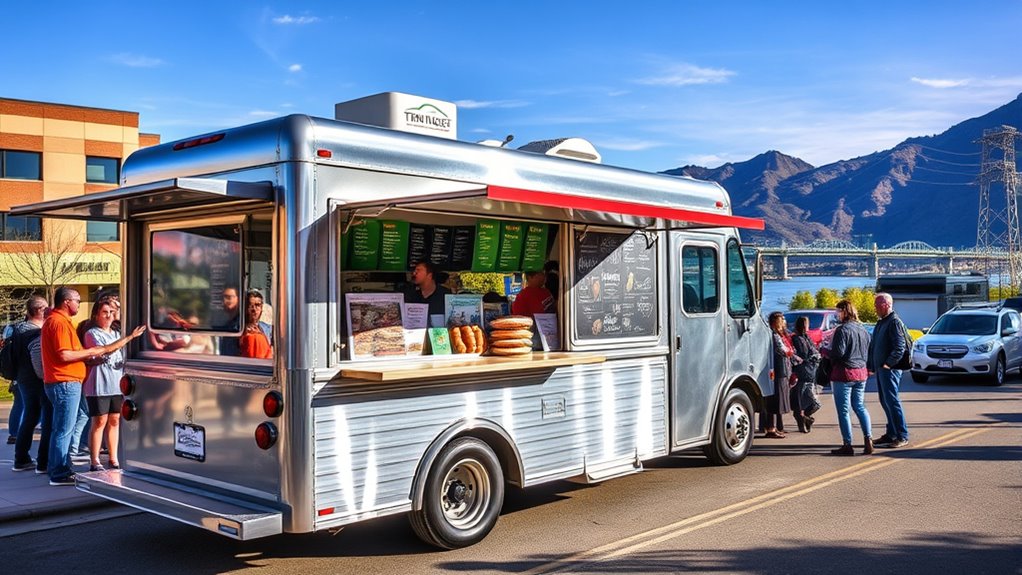
Handling permits and licensing procedures in Twin Falls requires careful planning and attention to detail. First, you need a health department license, since your food truck offers high-risk foods that require temperature control. Submit detailed plans, including layouts, plumbing diagrams, and equipment specs, for approval before starting construction or remodeling. An inspection by the Central District Health is mandatory to guarantee compliance with Idaho food safety standards. You’ll also need to pass an annual fire safety inspection, which involves having a certified fire extinguisher onboard. Additionally, obtain a business license from local authorities, ensuring you meet zoning and parking regulations. Early application is recommended, as processing times vary. Coordinating health and fire inspections beforehand helps prevent delays, so plan your schedule accordingly. Understanding local regulations and requirements is essential to ensure your food truck operates legally and smoothly from the start. Moreover, being aware of permitting processes can help streamline your licensing journey and avoid unnecessary setbacks.
Understanding Fees and Budgeting for Your Food Truck Venture
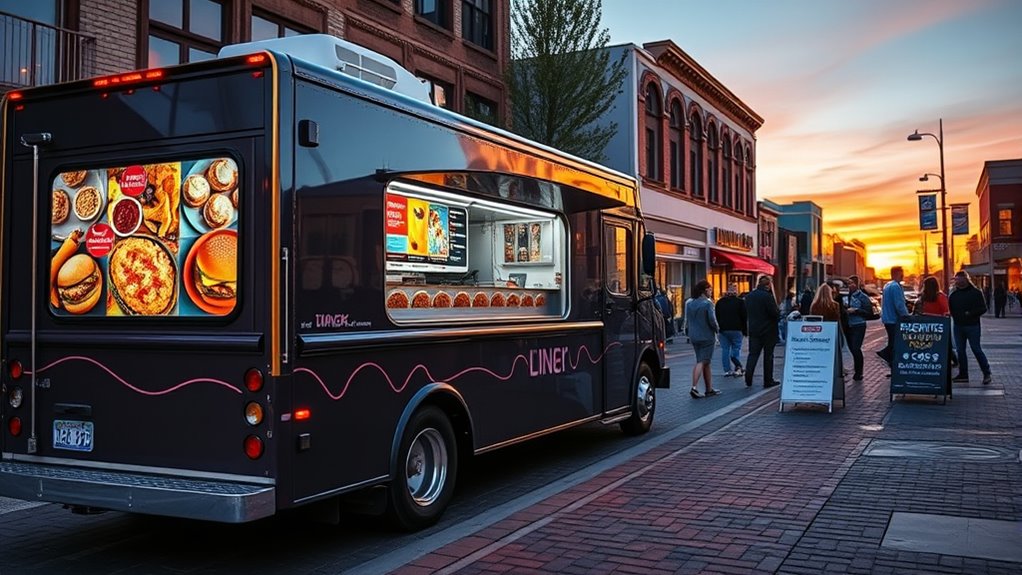
Budgeting for your food truck venture requires understanding the various fees and costs involved from the start. Initial expenses include the truck itself, which can range from $40,000 to $150,000, and permits that typically cost between $1,864 and $28,276. You’ll also need to budget for inventory ($2,000–$3,000) and equipment ($300+). Monthly costs like fuel and maintenance usually fall between $500 and $1,000. Consider additional expenses such as insurance, health permits, legal fees, and commissary rentals. Here’s a breakdown:
| Cost Category | Estimated Range | Notes |
|---|---|---|
| Startup Vehicle & Fit-out | $40,000 – $150,000 | Purchase or lease |
| Licenses & Permits | $1,864 – $28,276 | Local regulations |
| Inventory & Equipment | $2,300 – $4,800 | Supplies & kitchen tools |
| Monthly Operating Costs | $500 – $1,000 | Fuel, maintenance, insurance |
Additionally, understanding permits and local regulations is crucial for compliance and smooth operation.
Identifying Suitable Locations and Zoning Regulations
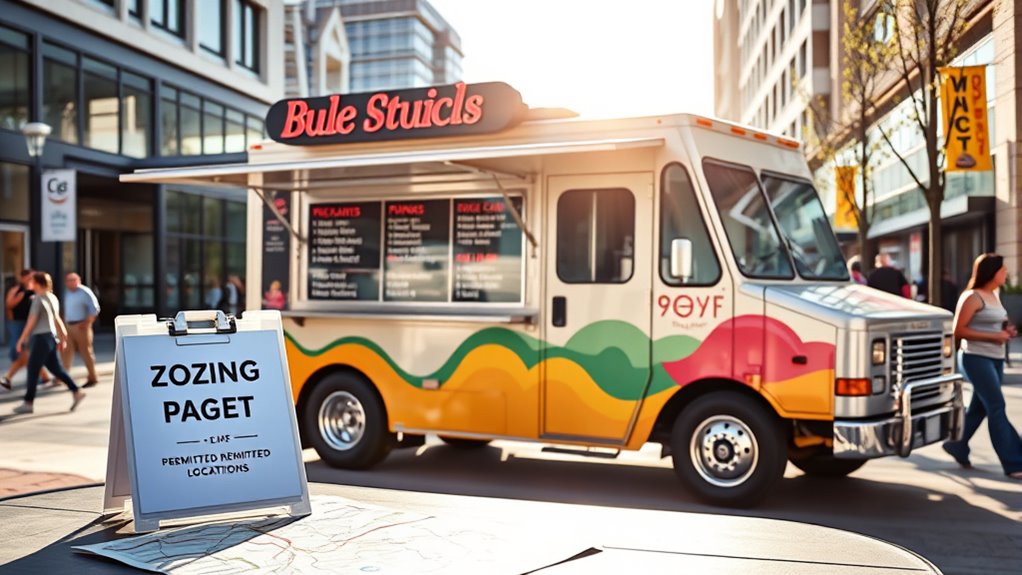
Choosing the right locations for your food truck in Twin Falls depends heavily on understanding local zoning regulations and land use policies. Twin Falls County zoning ordinances guide where commercial vending is permitted, mainly in commercial, industrial, or mixed-use zones. You must review the city’s zoning maps and matrices to confirm allowable areas. Keep in mind:
Select your food truck location in Twin Falls carefully, focusing on permitted commercial zones and compliance with local regulations.
- Food trucks are restricted from residential zones.
- Public space placement requires compliance with rules on sharing space and avoiding obstructions.
- Placement can’t block vehicle or pedestrian access, or be within 5 feet of utility boxes and safety features.
- Maintain a minimum 10-foot distance between vendors and obtain permits for special events or public space use.
- Ensuring your location aligns with zoning compliance helps prevent potential legal issues and facilitates a smoother setup process.
Engage with city officials early to verify your location choices and ensure full compliance with Twin Falls regulations.
Developing a Compliant and Appealing Menu
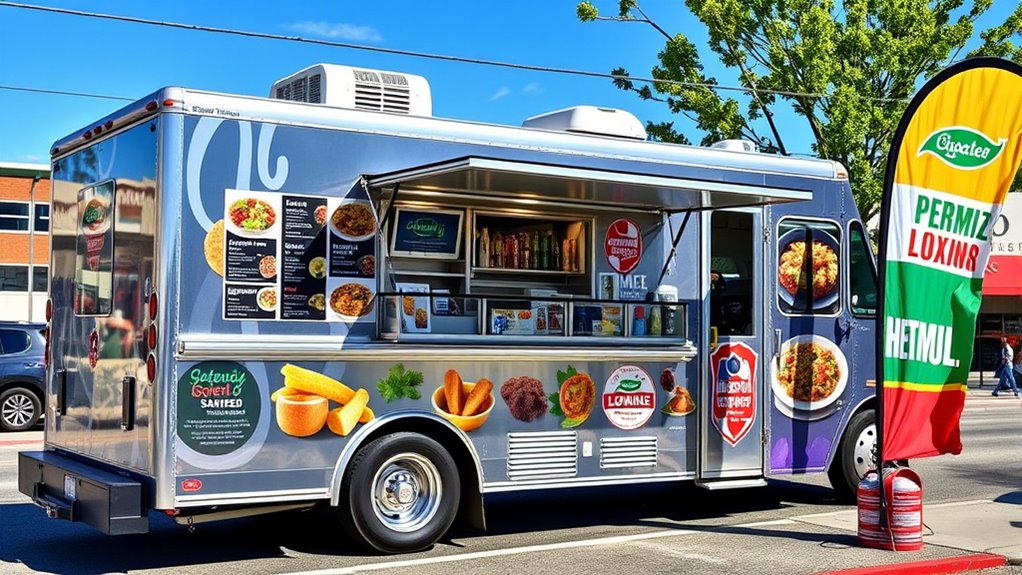
Developing a compliant and appealing menu for your Twin Falls food truck begins with understanding key health regulations and food safety standards. Your menu must follow the Idaho Food Code (IDAPA 16.02.19), sourcing ingredients only from approved, inspected commercial suppliers—home-prepared products are off-limits. Food prep should occur at an approved commissary or within the truck itself, not in home kitchens. Keep your menu simple, focusing on items that are quick to prepare and easy to serve, reducing inspection hurdles. Be transparent about ingredients, especially if offering raw or undercooked foods, and clearly disclose health risks. Ensure foods are held at proper temperatures and include allergen info. Opt for ingredients that can be prepped in advance to streamline operations and maintain compliance. When selecting packaging and utensils, consider USB-C options that are durable and compatible with your equipment to ensure seamless service.
Ensuring Food Safety and Sanitation Standards
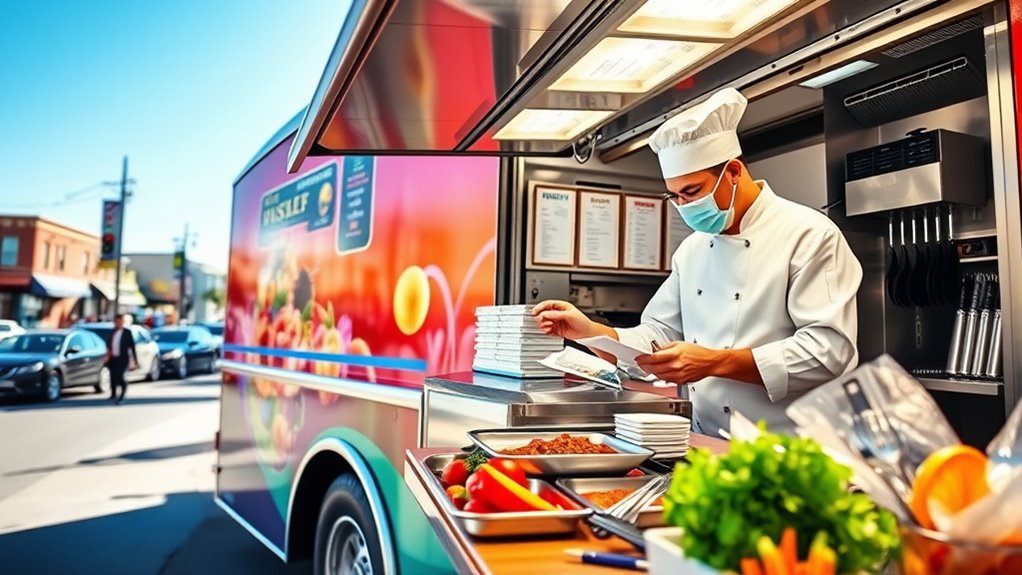
Maintaining food safety and sanitation standards is essential to protect your customers and comply with health regulations. You need to follow strict hygiene practices to prevent contamination and ensure food quality. Regular handwashing with hot water between 105°F and 120°F, along with soap, paper towels, and sanitizer, is mandatory. Use utensils or gloves instead of bare hands for ready-to-eat foods. Keep food at safe temperatures with accurate, food-grade thermometers, verifying proper cooking and cold holding. Your mobile unit must be fully self-contained, with sanitized surfaces and a three-compartment sink for cleaning utensils. Ensure pest-proof construction by sealing doors, windows, and vents, and implement ongoing pest control. Only source food from approved suppliers, store it properly, and label items for traceability. Incorporating hygiene practices aligned with current standards is vital for operational success.
Effective Marketing Strategies to Attract Customers
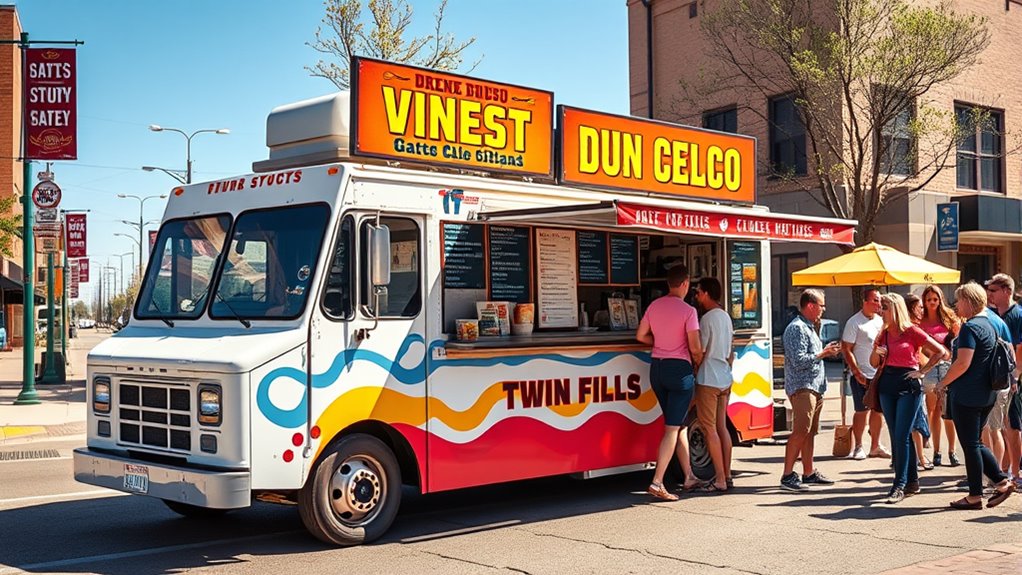
To effectively attract customers to your food truck, leveraging social media platforms is essential. Facebook is the dominant choice, with 75% of food trucks using it to connect with customers, boosting sales by up to 20%. Engaging content on social media can increase customer spending by around 15%. Additionally, mobile apps that help locate food trucks have seen a 35% rise in downloads, making it easier for new customers to find you. Participating in local festivals and community events is also powerful; 80% of trucks attend at least three annually, gaining visibility and building loyalty. Tailoring your menu to Millennials and Gen Z preferences—favoring sustainability, trending cuisines, and Instagram-worthy aesthetics—further enhances your appeal. Understanding the importance of equipment compatibility ensures your menu items are prepared efficiently and attractively.] Over 50% of food trucks have implemented loyalty programs, resulting in a 30% increase in repeat visits. Combining these strategies helps you attract a steady stream of loyal customers.
Preparing for Regulatory Inspections and Ongoing Compliance
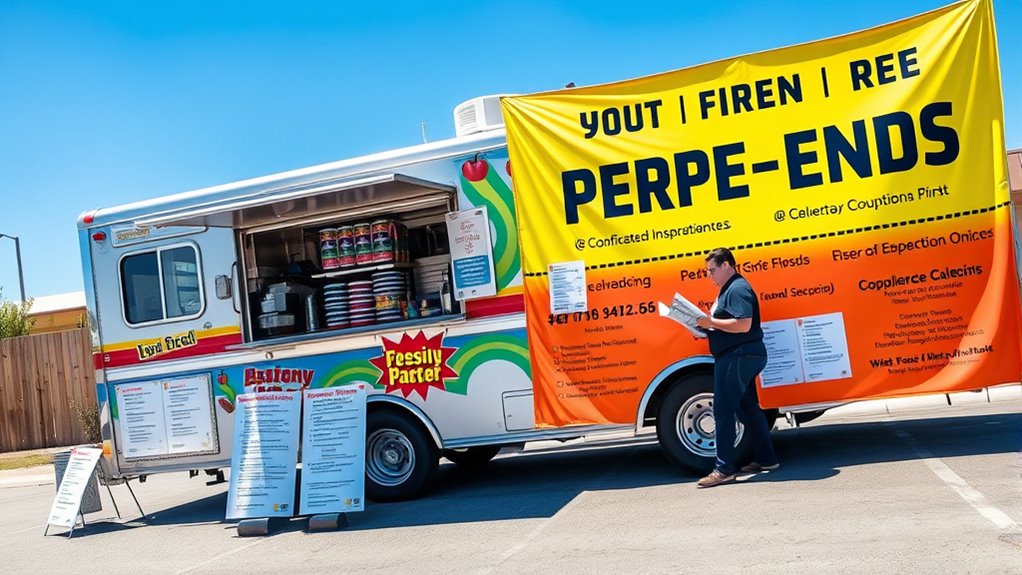
To stay compliant, you need to stay on top of inspection scheduling procedures and guarantee all necessary documentation is up to date. Adapting to code changes requires regular review of regulations and prompt updates to your operations. Keeping thorough records will help you pass inspections smoothly and avoid delays. Incorporating regulatory compliance practices into your routine ensures ongoing adherence to evolving standards.
Inspection Scheduling Procedures
Scheduling inspections for your food truck in Twin Falls is a crucial step to guarantee you stay compliant with local fire and health regulations. You need to contact the Fire Department’s Fire Prevention office ahead of time to set up your initial and annual inspections. Inspections are conducted Monday through Friday, from 8 am to 5 pm, so plan accordingly. To ensure smooth approval, consider these key points:
- Book your appointment well in advance to allow time for necessary corrections.
- Confirm your inspection date through direct contact via phone, email, or online portal.
- Prepare all required documents, including fire safety equipment and vehicle compliance.
- Keep permits and inspection records easily accessible for ongoing compliance and renewal.
Timely scheduling helps you avoid delays and ensures your truck remains operational year-round.
Maintaining Documentation Standards
Maintaining thorough and organized documentation is essential for a food truck operating in Twin Falls, especially when preparing for inspections and ensuring ongoing compliance. You need to keep current copies of health permits, licenses, and inspection reports accessible at all times. Also, archive approved plans, commissary agreements, and special permits related to your operations. Regularly update equipment maintenance records, pest control logs, and structural compliance documentation to demonstrate adherence to standards. Track water and wastewater logs, food storage temperatures, and servicing records to meet Idaho Food Code requirements. Additionally, maintain employee training records, operational procedures, and incident reports. Keeping these documents organized ensures smooth inspections and continuous compliance. Incorporating essential oil knowledge can also be beneficial for maintaining a healthy and stress-free environment for staff.
Adapting to Code Changes
Staying compliant with evolving food safety and health codes requires proactive monitoring and swift adaptation. You need to stay informed about updates through official websites and newsletters. When codes change, consider:
- Upgrading equipment and infrastructure, like plumbing or ventilation, with approved materials.
- Training staff on new sanitation methods, food handling protocols, and documentation requirements.
- Preparing for unannounced inspections by keeping licenses, permits, and operational plans readily accessible.
- Adjusting procedures for food storage, preparation, and waste disposal to meet new standards.
- Recognizing cybersecurity vulnerabilities that might impact your business operations and implementing protective measures accordingly.
Regular internal audits help catch issues early. Engage with health authorities for clarification, attend workshops, and review guidance materials. Staying proactive guarantees your food truck remains compliant and ready for inspections. Monitoring regulations regularly helps ensure ongoing compliance and prevents costly violations.
Frequently Asked Questions
Do I Need a Separate License for Each City I Operate In?
You’ll need a separate license for each city you operate in because local rules vary. When you move your food truck to different cities, you must acquire their specific business licenses and Mobile Food Vendor Permits. These licenses guarantee you’re compliant with local zoning, hours, and safety regulations. Always check with each city’s health department and licensing office to confirm requirements and avoid penalties while expanding your food truck business.
Are There Restrictions on the Type of Food I Can Sell From a Truck?
You wonder if there are restrictions on the food you can sell from your truck. In Twin Falls, Idaho, you must follow health regulations for safety foods, including proper licensing and sanitation. Certain foods like alcohol or perishables may need extra permits. Local zoning and safety rules also limit specific food types and vending locations. Always submit your menu plans for approval to make certain of compliance and avoid legal issues.
Can I Park and Operate My Food Truck on Private Property?
Your dream of parking your food truck on private property can become reality, but you’ve got to play by the rules. You need property owner permission, and your location must follow Twin Falls zoning laws—like staying 50 feet away from residential areas. Plus, you’ll need health permits, licenses, and inspections. Stay compliant, and your truck can serve delicious food right where you want it, legally and safely.
What Insurance Requirements Are Necessary for a Mobile Food Vendor?
You need to meet specific insurance requirements as a mobile food vendor. Idaho mandates you carry commercial auto insurance for your food truck to cover liability in case of accidents on public roads. Additionally, securing general liability insurance protects you from claims related to injuries or property damage at your truck. Consider product liability insurance for food-related claims and property insurance to safeguard your equipment. These coverages help you operate legally and reduce financial risks.
How Do I Handle Waste Disposal and Sanitation on the Go?
To handle waste disposal and sanitation on the go, you need a wastewater tank at least 15% larger than your potable water tank, with a proper drain and shut-off valve. Regularly empty trash containers and keep the area clean, free of litter and grease. Make certain you have dedicated handwashing and three-compartment sinks, and follow local health regulations for waste disposal at approved facilities. Proper sanitation keeps you compliant and safe.
Conclusion
Starting a food truck in Twin Falls might seem overwhelming, but with thorough planning and compliance, you’re set for success. Some say food trucks can’t thrive without a brick-and-mortar, but history proves otherwise—many entrepreneurs build thriving businesses on wheels. Trust in your passion, prepare diligently, and embrace the journey. Your unique flavors could become Twin Falls’ next beloved staple, showing that with determination, the road to success is always within reach.
